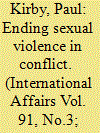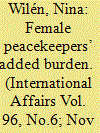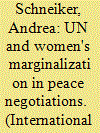|
|
|
Sort Order |
|
|
|
Items / Page
|
|
|
|
|
|
|
| Srl | Item |
| 1 |
ID:
138944


|
|
|
|
|
| Summary/Abstract |
During the past year, the UK Government has become the lead advocate for a perhaps surprising foreign policy goal: ending sexual violence in conflict. The participation of government representatives from more than 120 countries in a London Summit in June 2014 was the clearest manifestation of this project. This article offers an early assessment of the Preventing Sexual Violence Initiative (PSVI) and situates it within the history of global action against sexual and gender-based violence from UN Security Council Resolution 1325 onwards, with a particular focus on three key developments. First, the PSVI has embraced the already common understanding of rape as a ‘weapon of war’, and has stressed the importance of military training and accountability. This has exposed the tensions within global policy between a focus on all forms of sexual violence (including intimate partner violence in and out of conflict situations) on the one hand, and war zone activities on the other. Second, the Initiative has placed great emphasis on ending impunity, which implicates it in ongoing debates about the role of international and local justice as an effective response to atrocity. Third, men and boys have been foregrounded as ignored victims of sexual and gender-based violence. The PSVI has been crucial to that recognition, but faces significant challenges in operationalizing its commitment and in avoiding damage to existing programmes to end violence against women and girls. The success of the Initiative will depend on its ability to navigate these challenges in multiple arenas of global politics.
|
|
|
|
|
|
|
|
|
|
|
|
|
|
|
|
| 2 |
ID:
178118


|
|
|
|
|
| Summary/Abstract |
Twenty years since the adoption of UN Security Council Resolution 1325 there is an almost unanimous call for an increased number of uniformed women in peace operations from policy-makers and multilateral organizations. This continuous push for the inclusion of more women is often justified by arguments about an increased operational effectiveness related to women's ‘added value’: both implicitly and explicitly advocating for greater gender equality. Yet, in this article, I contend that using instrumentalist arguments to increase the number of female peacekeepers may on the contrary undermine gender equality. This is related to the risk of producing self-fulfilling prophecies whereby female peacekeepers try to live up to the high expectations by fitting into gender-stereotypes and/or by working harder than their male colleagues. Rather than increase gender equality, such efforts risk transforming the female ‘added value’ to an ‘added burden’ which male peacekeepers do not have to carry. Anchoring the study in feminist theory with the aim to understand gendered relations of power, to illustrate my argument I draw on extensive interview material from military staff and peacekeepers in South Africa, Burundi, Belgium and Niger; interviews and informal discussions with female and male peacekeepers; and participation in several policy and research workshops on female participation in peacekeeping.
|
|
|
|
|
|
|
|
|
|
|
|
|
|
|
|
| 3 |
ID:
179817


|
|
|
|
|
| Summary/Abstract |
Although UN Security Council Resolution 1325 calls for increased participation of women in all stages of a peace process, the number of women who participate in formal peace negotiations is still very limited. In order to augment their number, UN Women and other international organizations have published a series of policy reports in which they argue that women's participation increases the success of peace negotiations and leads to more inclusive peace agreements. However, based on an analysis of relevant policy reports and interviews with women and men involved in peace negotiations, I argue that the policy reports do not lead to women's empowerment. Instead, they contribute to women's marginalization in peace negotiations, because they entrap women between conflicting expectations. The type of behaviour that international advocates of the Women, Peace and Security (WPS) agenda expect of women when they participate in peace negotiations limits the women's room for manoeuvre—at best. At worst, this type of behaviour prevents women from participating in the negotiations, because it is dismissed by domestic (male) negotiators. But if women who participate in peace negotiations violate the behavioural script proposed by the policy reports, they are considered as not acting in line with the WPS agenda. Hence, no matter how women behave when they sit at the negotiation table, they either lose the support of international or national gatekeepers.
|
|
|
|
|
|
|
|
|
|
|
|
|
|
|
|
|
|
|
|
|